
It's one thing to make policies that put people first in company culture. It's another thing entirely to model them. But being part of a corporate social experiment designed to prove that putting the bottom line and people first are not competing ideals? Better buckle up!
Getting beyond lip-service often means a lot of falling down and getting things wrong before you find your groove. Our Founder, Karolyn Hart, jokes about our being "UnInspireHUB" while we fumbled through the transition from a more traditional workplace to the 100% remote—and empowered—workplace we have now. She's bent on disrupting some of the most toxic foundations of corporate culture, starting with ours.
While the sign-off on rebooting might happen at the top, the biggest changes often start from the bottom up. Buy-in has to be across all teams and pay grades. "Ask me anything" style collaboration, a willingness to kill sacred cows and valuing "impact" over "hours" may make great sound-bytes, but feel like very risky business when it comes to the bottom line.
And yet something funny happens when you treat people like capable adults. They tend to rise to the occasion, and so does your ROI.
Here are some of the experiments that have paid off best at InspireHUB...
1. We can work from anywhere. We're a 100% virtual workforce.
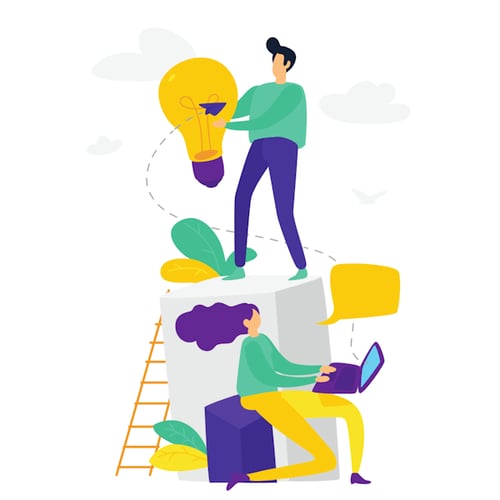
At InspireHUB, we are required to manage our own schedules and time off. We've had people dial in from the U.S., Canada, Italy, England, Ireland, China, Thailand and even hikes on the Bruce Trail and from the peaks of Machu Picchu. Our productivity is actually better because we can be digital nomads with a well-fed worldview. As a company with clients spread around the world, that matters to us.
Creativity feeds engagement. Where we once had a physical office, we quickly saw the productivity and health benefits of allowing our staff to telecommute in from anywhere in the world, and to manage their hours around their own optimal productivity. (But hey, don't take our word for it. Check out this 2-year study done by Stanford.)
Truth be told, some of us have a hard time logging off. Which leads to one of the biggest surprises...
2. We have unlimited vacation time.
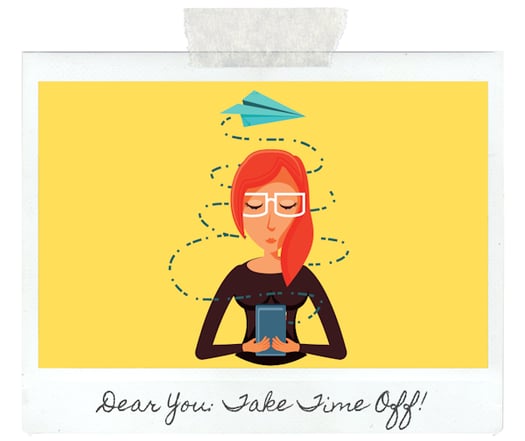
Staff can take as much time off as they need, whenever they need it, for whatever reason they do. Sounds like a recipe for disaster and abuse, right? It's actually had the opposite effect. Our employer has to make us take time off so we're not burning out. We have a “vacation minimum” of time we must take every year.
So how does something like that work? We value "impact" over "hours" and collaborate with our team to come up with creative ways of being healthy as people and healthy as a workplace. It's one of the many things that inspire genuine loyalty and engagement.
There are 2 critical guideposts that keep things on track. The first is, like any responsible company, we have goals and KPIs. We're given the freedom to be creative in how we get there, but the measure remains the same. The second is daily standup meetings to make sure we're on track and ask where we need to make adjustments.
Here's something else that's contributed to having teammates that both thrive on autonomy and can manage the unique challenges of remote work (it's not for everyone!) ...
3. We do "paid auditions" instead of interviews.
This allows both our team and the candidate to discover if we click, from corporate culture and communication style to work approach.
When I was coming aboard, I loved this! It gave me the chance to figure out if InspireHUB was a good fit for me as much as it gave them the chance to find out if I was a good fit for their team. It's a meaningful litmus test for the truest indicators of future productivity and retention: our shared goals and values, and our ability to "play together" as well as we work.
One of my favourite moments from this practice arrived in the form of a candidate who actually turned our company into a live musical!
Sound a little unconventional? It's worked for us! Here's why...
4. We believe successful hiring has less to do with the paper or initials behind someone's name and more to do with the right fit.
That's why we are so effective and so committed to each other. We've passed on highly-credentialed candidates in favour of a junior recruit that better fit our culture and ended up with some of our strongest team leads ever.
The result? We've got everyone from rocket scientists and tech pioneers to human trafficking fighters, adventure divas and professors.
5. We write our own job descriptions and reinvent as we find new ways of using our personal skills to adapt to both our corporate and customer's needs.
There's a fluidity in cross-functional teams that come together around a current need or project then break apart and reassemble as something else when a new opportunity or challenge arises. It's also what keeps us agile and engaged. Karolyn actually goes out of her way to help each of us find our sweet spot, using the CareerLeader assessment tool to help us discover the intersection between our passions and our work preferences then partners with us to come up with a plan to leverage that. How do you put a price on that? Payscale.com has a free set of tools to help you with that.
6. We're encouraged to ask questions. Lots of them.
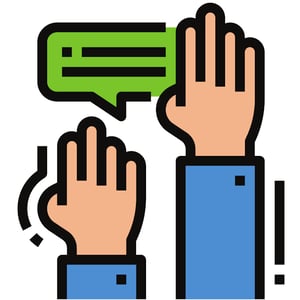
Are we happy? Are we effective? Is there something else we could/should be doing? How can we show our customers more love?
Questions are one of the most critical tools in how we work together and for our clients. (Just as important as questions? Sometimes it's the answer "no" and, well, "no.")
When you foster inclusiveness and commit to giving staff both a voice and the ability to act on it and innovate, it matters. It works. It inspires loyalty, productivity, and engagement.
7. Our design days aren't just for us, they're for our clients.
One of the places asking questions is most useful is leaning into road bumps. When we're working with a client partner, if a member of their team is unhappy with one of our processes, we invite them to come alongside us and imagine a better way of doing it.
In fact, customers have informed virtually every aspect of our product design!
This has become such an important part of our relationship with clients that, instead of waiting for problems to arise, we've made "Design Days" a fundamental part of our business, inviting clients to shape both our product and the user experience.
8. We are empowered.

One of the best things our Founder did was to turn our corporate culture into "Edison's Lab." She tucks in homework that includes everything from TED Talks to tips from Navy Seals and even an FBI international kidnapping negotiator, and while the latter may sound nuts it's actually a really inspiring way of brainstorming new tactics.
We're invited to share ideas about ways of improving our corporate culture, communications, customer happiness, and work-life balance.
We're encouraged to try lots of new things as Edison did without overthinking them, to not fear failure, and to take those failures and improve on them with rapid iteration. This is one of the parts of our culture I appreciate the most. When you have a voice and it's valued and acted on, that's rocket-fuel for your corporate ROI.
Three of my favourite homework assignments:
9. We understand that wellness is essential to productivity.
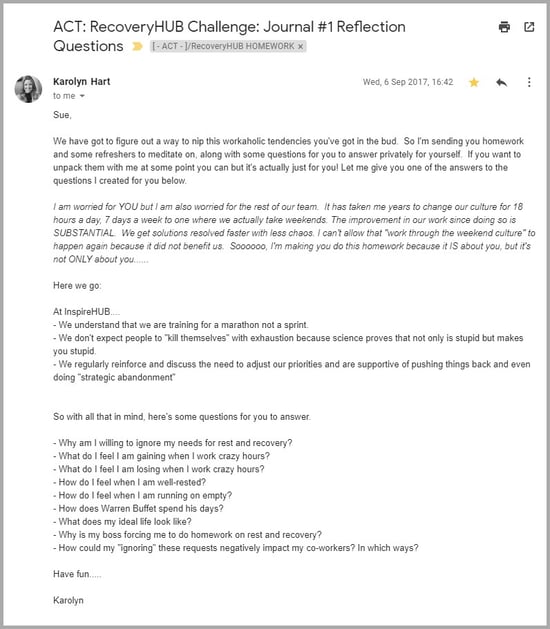 I mentioned one of the unexpected byproducts of our "unlimited vacation" policy was that a lot of us didn't end up taking a vacation at all. In fact, to say we had a problem disconnecting from work might have been an understatement.
I mentioned one of the unexpected byproducts of our "unlimited vacation" policy was that a lot of us didn't end up taking a vacation at all. In fact, to say we had a problem disconnecting from work might have been an understatement.
(Did you know the brain starts to cannibalize itself when it doesn't get enough sleep?)
⯇ Karolyn actually hosted an "intervention" for me to meet my own workaholic problem head-on.
Yes, my employer actually told me I was working too much and said "we need to talk about your rest," then followed up with homework to help me understand why it was great for both me and for the company for me to have a better work-life balance.
She worked hard to create an environment and set of strategies to help me thrive. Tough love on crack!
Words of wisdom from a few other champions of workplace wellness include:
- Jeffrey Pfeffer ⯈ critical thinking in his "Dying for a Paycheck"
- Lale Kesebi ⯈ her TEDxWanChai call-to-action to transform the workplaces that are killing us
- Brady Wilson ⯈ his TEDxMississauga talk, "How to fix the exhausted brain," including "benevolent brain hacks" that explore the chemistry of connection and motivation
10. Our employees are family and supported that way.
Last year I battled cancer and it was my employer and teammates who were right there beside me in the trenches, driving me to appointments, going to treatments with me, helping me with research and accessing the people and things I need most, and even paying me a full salary while I was fighting this instead of putting me on sick leave with a lower pay.
I'm not the only one they have done this for. Whenever one of us has had to battle through illness or traumas, it's our employer who is the first to step up and champion our cause.
Are workmates as family a rare thing? Not so much. Take a look at this study that suggests people feel the greatest sense of belonging at work.
11. We have a "Mandatory Fun Officer."
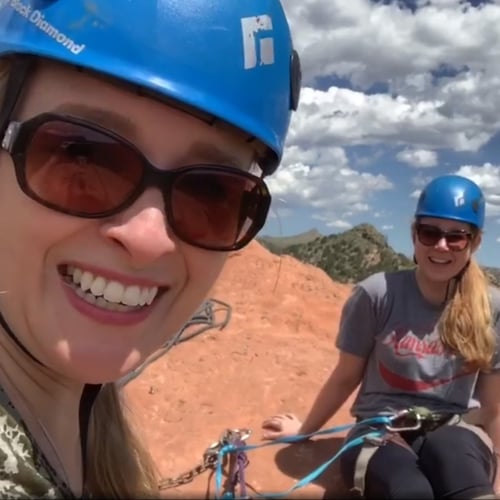 When you work in a remote office this is one of the best ways to grow the kinds of bonds you don't have the opportunity to form face-to-face. In our team meetings, we have done virtual scavenger hunts, costume days, virtual "Secret Santa" events, and show-and-tells. A few of the things that made the latter both an awesome and deeply human moment: ultrasound pictures from one of our team who was about to become a parent again; and sharing the joy of another team member who became a "Permanent Resident" in Canada last year. It helps you remember that what makes a business vital is the people who shape it and that it starts with the bond that they share. When you truly care about each other, are in genuine awe of each other, you pull in the same direction.
When you work in a remote office this is one of the best ways to grow the kinds of bonds you don't have the opportunity to form face-to-face. In our team meetings, we have done virtual scavenger hunts, costume days, virtual "Secret Santa" events, and show-and-tells. A few of the things that made the latter both an awesome and deeply human moment: ultrasound pictures from one of our team who was about to become a parent again; and sharing the joy of another team member who became a "Permanent Resident" in Canada last year. It helps you remember that what makes a business vital is the people who shape it and that it starts with the bond that they share. When you truly care about each other, are in genuine awe of each other, you pull in the same direction.Our team is so close that our Christmas gift to ourselves last year was team crowdfunding to bring us all together to hang out for a weekend. We also went and visited one of our clients, Cooper's Hawk Vineyards, who not only gave us a behind-the-scenes tour but busted out a bunch of sleds so we could go tobogganing down one of their hills. As a remote workplace, this was golden. (Thank you, Tom O'Brien!)
Oh, and that picture up there? Our fearless leader (the one on the left) may or may not have talked some of us (including Mandatory Fun Officer, Audrey, right) into "mountain climbing" in Colorado after a recent Boy Scouts of America conference with some of our clients. 😏
Why does having fun at work matter so much?
- Economists at the University of Warwick found that happy people are 12% more productive.
- A study by BrightHR found that employees who have fun at work are less likely to take sick days, more likely to report feeling creative at work, and are more committed to their organization.
12. We are encouraged to cultivate our passions.

Sometimes it's really hard to say goodbye!
One of our teammates was not only responsible for a number of us choosing healthier lifestyles and plant-based diets, but he also went on to run an animal rescue sanctuary that is currently being featured on Animal Planet.
13. We care deeply about being good global citizens and creating space for volunteer projects as part of our workplace.
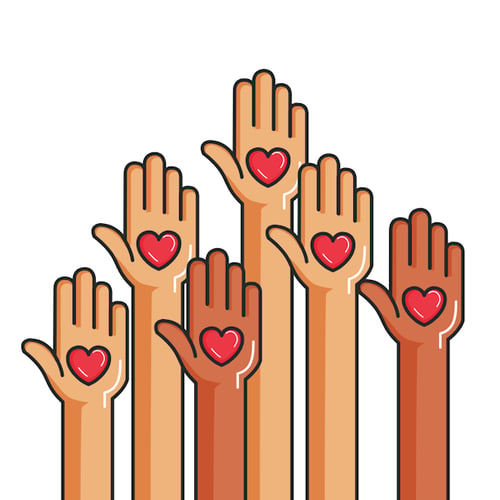
A part of the InspireHUB Credo is to encourage employees to volunteer and give back to the communities in which we live. As we are responsible for making our own hours, any requests to give back to the community are approved and schedules are accommodated to support this.
There are a few other folks that get social impact right, including:
- Ryan Simonetti ⯈ CEO and Co-founder at Convene on why companies can "do good" and "do well" at the same time
- Indra Nooyi⯈ and the work she did around leading with purpose and changing the way we make money to change the world during her time as Chairman and CEO of PepsiCo
- Jaimie Dimon ⯈ and the groundbreaking work he and the team at JPMorgan Chase & Co. did around community building
Organizational Changemakers worth adding to your bookshelf.
I've highlighted a number of leaders who have put empathy on the roadmap for transformation, but there are a few more who have actually written the book on it.
- Take a look at "Hit Refresh," where Satya Nadella shared the journey he took Microsoft on during his first three years as CEO. He talks about this in an interview with Dan Schulman, President and CEO of Paypal, another organization leading with people-first, and Beth Comstock on her Changemaker's Book Club Live Facebook chat.
- Simon Sinek's "Start with Why" is a primer on transforming company culture and creating a better world. His YouTube channel is filled with lots of thoughtful anecdotes on the "how" of this. He explains where the "why" came from in this 5-minute video.
- Daniel Lubetzky's "Do the KIND Thing: Think Boundlessly, Work Purposefully, Live Passionately" is another essential read. The CEO and Founder of KIND's father was a Holocaust survivor who was moved by the kindness of a German soldier, which is pivotal in the story of Daniel's world-changing companies. Lubetzky is one of the pioneers of social impact. (⯈more here⯇)
What about you?
What are some of the ways that your own organization is innovating around a healthier company culture? Go ahead and tuck a comment in below to share the things you love best, or join the conversation over at LinkedIn!
Looking for more small business help?
.png)
The Ultimate Small Business Survival Guide is Here
We've been helping InspireHUB clients not just survive during this time but THRIVE! We collected all of our advice and made it available for FREE as our great big give-back during this difficult time. Included in this FREE Guide:
- Transformation Readiness Assessment
- Practical Marketing Help
- Proven Strategies to Pivot Your Company
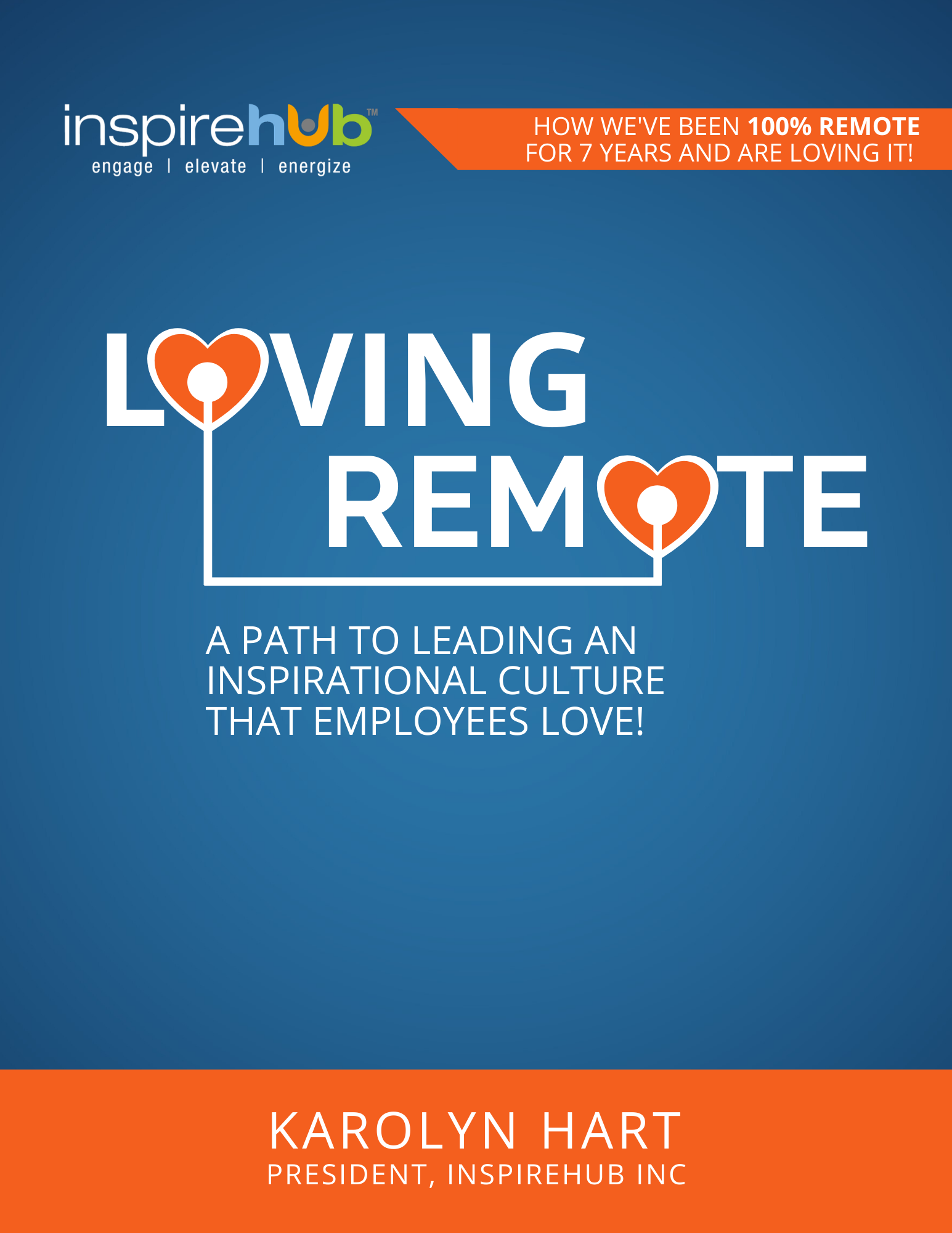
Lead an Inspirational Remote Work Culture that Employees Love!
At InspireHUB, we get it. We've been a 100% remote workplace for more than 7 years, and are the first to admit we were UN-InspireHUB while we learned to grow into it.
We put this book together because we saw so many people struggling as they've had to adapt to this new way of working overnight.
Here's how you can use it to grow YOUR small business too ...
Included in this FREE Guide:
- Why your remote team is experiencing fatigue.
- Understanding how leaders and employees have vastly different remote experiences.
- The lines you cannot cross with employee privacy when working remote.
- How to gamify your remote workforce.
- The rules of virtual engagement when it comes to working remotely.
- How the rules of meeting etiquette change in virtual meetings and why you must understand the difference!
Internal communications are essential to a company's growth and success. It impacts morale, productivity and revenue.
You might be surprised to learn the numbers behind the way businesses are using technology to boost employee engagement and the bottom line.
When employees are highly engaged morale goes up, productivity goes up and so do your profits.
While more companies are leading with empathy and wellness, employee engagement is often misunderstood and sometimes harder to translate into real ROI. Here are 10 things you should know right now ...

.jpg)
%20.jpg)